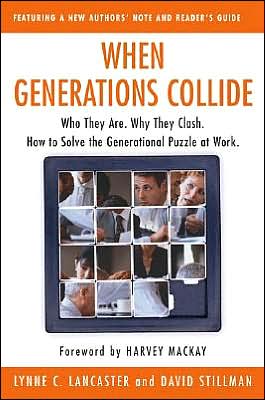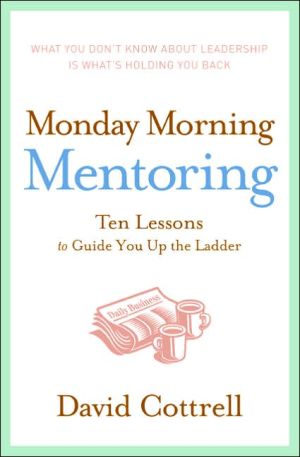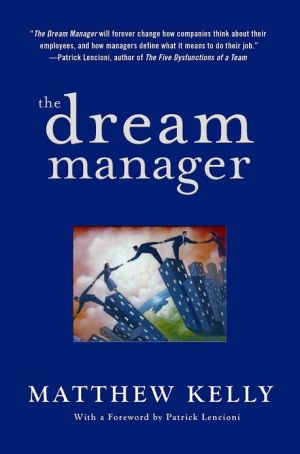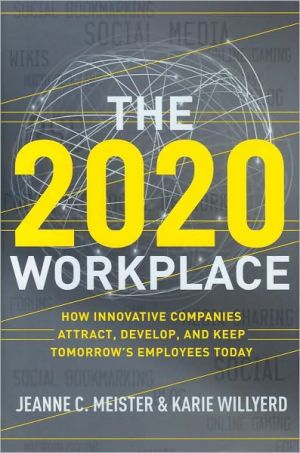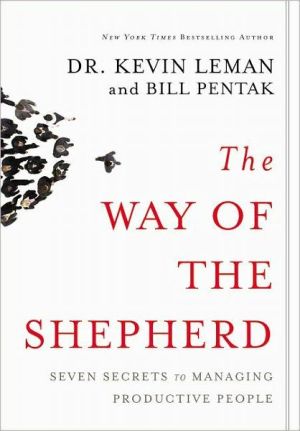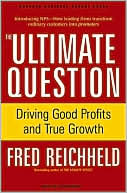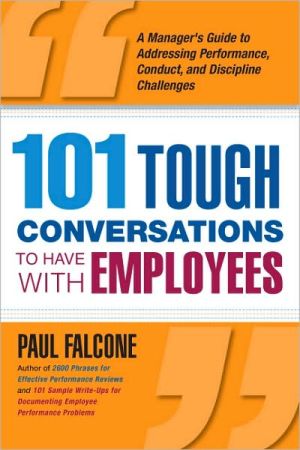When Generations Collide: Who They Are, Why They Clash, How to Solve the Generational Puzzle at Work
If your workplace feels like a battle zone and colleagues sometimes act like adversaries, you ore not alone. Today four generations glare at one another across the conference table, and the potential for conflict and confusion has never been greater.\ \ Traditionalist employees with their "heads down, onward and upward" attitude live out a work ethic shaped during the Great Depression.\ Eighty million Baby Boomers vacillate between their overwhelming need to succeed and their growing desire...
Search in google:
If your workplace feels like a battle zone and colleagues sometimes act like adversaries, you ore not alone. Today four generations glare at one another across the conference table, and the potential for conflict and confusion has never been greater. Traditionalist employees with their "heads down, onward and upward" attitude live out a work ethic shaped during the Great Depression. Eighty million Baby Boomers vacillate between their overwhelming need to succeed and their growing desire to slow down and enjoy life. Generation Xers try to prove themselves constantly yet dislike the image of being overly ambitious, disrespectful, and irreverent. Millennials, new to the workforce, mix savvy with social conscience and promise to further change the business landscape. This insightful book provides hands-on methods to close the generation gaps. With effective tools to recruit, retain, motivate, and manage each generation, you can now create teamwork, not war, in today's highperformance workplace . . . where at any age, productivity is what counts. Minneapolis Star Tribune “Lancaster and Stillman use real work situations, and more than a bit of wry humor, to ... make a good case.”
When Generations Collide\ Who They Are. Why They Clash. How to Solve the Generational Puzzle at Work \ Chapter One\ Generational Turbulence\ The Widening Generation Gap at Work\ "You two do that for a living?" asked David's seatmate with a disapproving raise of the eyebrow.\ Lynne observed David's reaction from across the aisle and hoped he wouldn't say something flippant. However, recognizing that this was a 3 1/2-hour flight and we had just leveled off, David settled down and took a deep, cleansing breath.\ The man's name was Paul. He was a craggy, sixty-five-year-old Traditionalist and the CEO of a national warehousing and distribution company. He liked the aisle seat, a vodka and tonic with no ice, and an extra pillow. He was probably wondering what two upstarts like us were doing in first class, but he was too polite to let on. Instead, he kept probing.\ "So tell me, what exactly does a 'generational expert' do?" he asked with a patronizing but unmistakably curious tone.\ Lynne jumped in: "We help employers and employees understand the differences among the generations, and we coach them in how to recruit, motivate, manage, and retain the generations more effectively."\ As Paul pondered this information, we wondered if he, like so many successful leaders, had ever thought about "generational differences" as one of the fundamental reasons American companies are experiencing hiring challenges, skyrocketing turnover rates, increasing communication conundrums, and plummeting morale. Had he ever recognized that clashes among Traditionalists, Baby Boomers, Generation Xers, and Millennials at work could take adirect toll on his bottom line?\ Paul fixed David with a thoughtful gaze. "When I was young, I didn't see eye to eye with my dad. Now my son's in the business and we butt heads all the time. Haven't there always been generational conflicts in the workplace?"\ "Sure," David responded. "The generations have always clashed. But the generation gaps in the workplace today are wider than ever and of greater strategic importance. Think about it. Americans are living and working longer. The average life expectancy at birth in the year 1900 was forty-seven. Today it's closing in on eighty. Suddenly, four generations are facing off across the conference table instead of just one or two."\ "Okay," Paul replied, "but what's the problem? As I see it, more generations mean more available workers."\ "That's a good point," David responded. "But what most people overlook is that each generation brings its own set of values, beliefs, life experiences, and attitudes to the workplace, and that can be the problem. Take your generation, the Traditionalists. You grew up under the shadow of the Great Depression and felt lucky to have jobs. If we have learned one thing in our research, it is just how strong Traditionalists' beliefs are when it comes to patriotism, hard work, and respect for leaders, among other values they bring to the workplace."\ Paul nodded.\ "Now, compare that to my generation," David continued.\ Paul eyed David's T-shirt and parachute pants "travel ensemble." "Hmm, and exactly what generation would that be?" he queried with a raised eyebrow.\ "Generation X," David responded proudly. "We grew up seeing too many businesses downsize or merge, and we learned that the last thing we could trust was the permanence of the workplace. Let's face it, by the time we hit the job market, the employer-employee contract was already out the window and Social Security was headed down the toilet. And it sure didn't help that we've always been told we would never do as well as our parents had. As a result, we need to be recruited, rewarded, and managed differently from your generation if you hope to make us a contributing, loyal part of your workforce."\ Paul turned back to Lynne. "I assume you're an Xer, too?"\ "I must admit to actually being a Baby Boomer," she responded, blushing. David rolled his eyes and wanted to grab an airsickness bag.\ "So, Boomer, what's your story?" Paul demanded.\ "Well," answered Lynne, "My generation is different from yours and David's. When you've had to vie with eighty million peers every step of your career, you're bound to be competitive. We were raised by parents who convinced us we could make the world a better place; as a result, we tend to be idealists. We came to the workplace with a strong desire to put our own stamp on things.\ "Yeah, I've definitely locked horns with a few of you in my workplace," Paul confirmed with a nod of his head.\ Lynne continued: "You have to put the generations in an economic context. The long economic expansion of the 1990s created a situation of almost full employment in the United States. David's generation was promoted rapidly and was offered more financial and job growth opportunities than ever in history. Rather than paying their dues for a number of years, they've been able to demand that companies adapt to their ways of doing things. This has created both a culture clash and a resentment backlash as the generations collided around issues of fairness and opportunity.\ "At the same time, low unemployment levels created major staffing problems. For example, one of our clients who owns a box factory in Catawba City, North Carolina, complained to us in 2000 that his town's unemployment rate had dropped to .8 percent! Imagine trying to recruit a workforce to operate a noisy plant that smells like diesel fumes and rotten eggs when the same workers can find jobs at an air-conditioned mall for the same money — and enjoy the scent of Mrs. Fields cookies!"\ "Now hold on there," Paul interrupted. "Let's face it, as soon as our economy takes a nosedive, the younger generations are going to have to come begging for jobs."\ "But that's only part of the picture," David countered....\ There's a talent war out there. Because Generation X is just a little over half the size of...\ When Generations Collide\ Who They Are. Why They Clash. How to Solve the Generational Puzzle at Work. Copyright © by Lynne Lancaster. Reprinted by permission of HarperCollins Publishers, Inc. All rights reserved. Available now wherever books are sold.
Authors' Note to the Paperback EditionAcknowledgmentsForewordIntroduction: How this Book Came to BeSect. IWho Are the Generations and Why Do They Collide?11Generational Turbulence32From World War II to the World Wide Web103The Tie-Dyed Preppy364Race, Religion, Gender ... What Next?42Sect. IIPutting the Generations to Work495What Do You Want to Be When You Grow Up?516From a Gold Clock to Founders' Stock707Scoring a Perfect "10" on the Balance Beam978Sitting on a Porch Swing Drinking Metamucil?1229Is Fun Really the "F-Word"?141Sect. IIIRecruiting the Generations14910Finders Keepers15111Why Would Anyone Want to Work for You?16312Ready, Aim, Hire!18013Diamonds in the Rough19914Here's Your Boss and Benefits; There's the Bathroom215Sect. IVRetaining and Managing the Generations23515The Solid Oak Door has Become a Revolving One23716Is No News Really Good News?25317The School Bell is Ringing More Loudly Than Ever27518"I Once Diapered Somebody Who's Now My Boss's Age"29719Minding Your Generational Ps and Qs30820Connecting Over the Kung Pao319Sect. VWhere Do We Go from Here?32921Are We There Yet?331Bibliography337Index339Readers' Guide353
\ Time“The authors offer many examples of trouble spots where generational conflicts are most likely to explode...thought-provoking insights.”\ \ \ \ \ Boston Globe"Rich, engrossing...instructive and profound...This stimulating, valuable ... business book... resonates on a sociological level."\ \ \ Entrepreneur"The two experts in managing age-related conflicts boil complex issues down to their essences."\ \ \ \ \ Minneapolis Star Tribune"Lancaster and Stillman use real work situations, and more than a bit of wry humor, to ... make a good case."\ \ \ \ \ Time Magazine"The authors offer many examples of trouble spots where generational conflicts are most likely to explode...thought-provoking insights."\ \ \ \ \ Entrepreneur“The two experts in managing age-related conflicts boil complex issues down to their essences.”\ \ \ \ \ Boston Globe“Rich, engrossing...instructive and profound...This stimulating, valuable ... business book... resonates on a sociological level.”\ \ \ \ \ Minneapolis Star Tribune“Lancaster and Stillman use real work situations, and more than a bit of wry humor, to ... make a good case.”\ \
